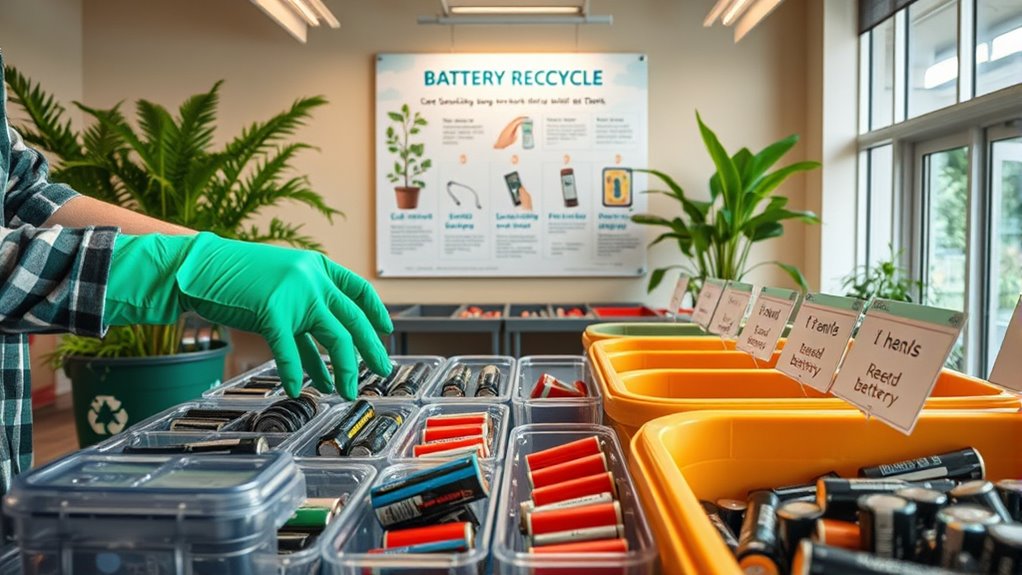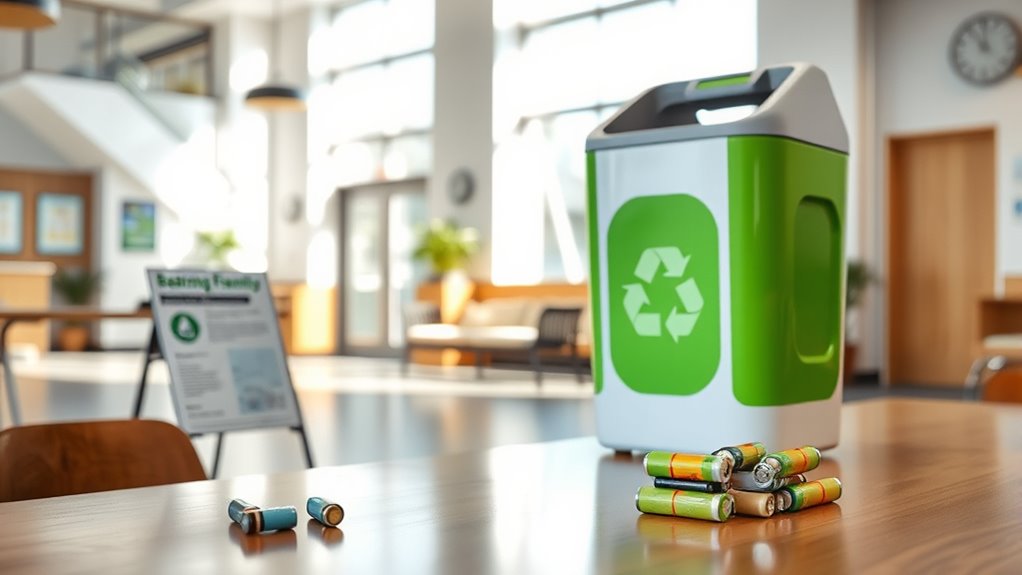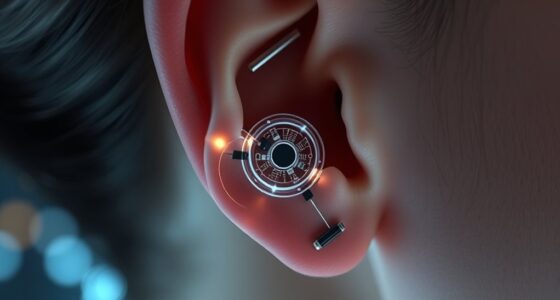Implementing battery recycling programs for hearing devices is a smart way for you to help protect the environment and conserve resources. By using convenient drop-off points or mail-in options, you guarantee batteries are handled safely and properly disposed of. Well-organized programs prevent hazardous leaks and fires, while also reducing the need for virgin materials. Taking part in these initiatives supports sustainability and community health—keep going to discover more about how you can make a difference.
Key Takeaways
- Recycling hearing device batteries prevents environmental harm and conserves valuable materials like zinc and silver.
- Effective programs include mail-in options and community drop-off points for easy, accessible recycling.
- Proper disposal through designated programs reduces fire risks and hazardous chemical leaks.
- Recycling supports a circular economy, decreasing demand for virgin resources and encouraging eco-friendly battery development.
- Community education and engagement boost awareness and participation in sustainable battery disposal practices.

Battery recycling programs play a crucial role in reducing environmental harm caused by discarded batteries. When you choose to participate in these programs, you help lessen the negative environmental impact associated with improper disposal. Discarded batteries, especially those used in hearing devices, can leak harmful chemicals into the soil and water if not properly recycled. By recycling, you prevent these toxins from polluting ecosystems and protect public health. This process ensures that valuable materials like zinc, silver, and lithium are recovered and reused, reducing the need for mining new resources. Recycling logistics are central to making these programs effective. Efficient collection systems, transportation, and processing facilities coordinate to ensure batteries are handled safely and sustainably. When you bring your used hearing device batteries to designated recycling centers, you’re contributing to a well-organized system that minimizes waste and maximizes resource recovery. Proper recycling logistics also help prevent batteries from ending up in landfills, where they pose fire risks and release hazardous substances. These programs often partner with waste management agencies and electronic waste collectors to streamline collection and processing, making it easier for you to do your part. Furthermore, the environmental impact of well-managed recycling programs extends beyond just reducing waste. They promote sustainable practices by conserving natural resources and lowering greenhouse gas emissions associated with manufacturing new batteries. Your participation sends a message that you value environmental responsibility, encouraging manufacturers to develop safer and more eco-friendly hearing device batteries. In addition, many programs educate consumers about the importance of battery recycling, making it simple for you to understand how your actions make a difference. Recycling logistics are designed to be user-friendly, with clear instructions on where and how to recycle batteries from hearing devices. These programs often include mail-in options or drop-off locations in accessible community centers, making it convenient for you to contribute. By supporting these initiatives, you’re helping to create a circular economy where materials are continuously reused, reducing the demand for virgin resources. This effort ultimately results in cleaner environments and healthier communities. Proper disposal through battery recycling programs isn’t just a responsible choice—it’s an essential step toward safeguarding the environment. Your commitment to recycling can markedly reduce the environmental impact associated with battery waste, while effective recycling logistics ensure that this process is seamless and impactful. Together, these efforts make a meaningful difference, proving that small actions can lead to big environmental benefits.
Frequently Asked Questions
Are There Incentives for Participating in Battery Recycling Programs?
You might wonder if there are recycling incentives for participating in programs. Many organizations offer rewards or discounts to encourage program participation, making it easier for you to do your part for the environment. These recycling incentives can include gift cards, discounts on future purchases, or even small monetary rewards. By taking part in such programs, you not only help reduce waste but also enjoy the benefits of these incentives.
How Often Should Hearing Aid Batteries Be Recycled?
Did you know that hearing aid batteries typically last between 3 to 10 days? To maximize their battery lifespan and reduce environmental impact, you should recycle them as soon as they’re no longer useful. Recycling frequency depends on your usage, but a good rule is to do it whenever the battery is fully drained or at least once a month. This guarantees proper disposal and supports eco-friendly practices.
Can Recycled Batteries Be Reused in Other Devices?
You might wonder if recycled batteries can be reused in other devices. Generally, once batteries are recycled, their battery material is processed to recover valuable metals like lithium and cobalt. This recycling reduces waste and improves reuse potential, but the recycled materials typically aren’t directly reused in new batteries or devices. Instead, they’re transformed into raw materials that can be used to produce new batteries, supporting sustainability and reducing environmental impact.
What Is the Environmental Impact of Improper Battery Disposal?
You might think improper battery disposal isn’t a big deal, but it profoundly impacts the environment. When batteries are thrown away carelessly, e waste pollution increases, and harmful chemicals can leach into the soil, causing contamination. This damages ecosystems and jeopardizes human health. By disposing of batteries properly, you help reduce soil contamination and limit e waste pollution, making a positive difference for our planet’s future.
Are There Specific Recycling Programs for Different Types of Hearing Aid Batteries?
You should know that specific recycling programs exist for different hearing aid batteries, ensuring proper disposal. These programs focus on battery collection and follow strict recycling standards to prevent environmental harm. By participating in these specialized programs, you help reduce toxic waste and promote sustainability. Always check with local recycling centers or hearing aid providers to find the right program for your battery type, ensuring responsible disposal and environmental protection.
Conclusion
Just as a gardener tends to each plant with care, embracing battery recycling guarantees our world blossoms brighter. Every small act of recycling becomes a seed planted for a greener future, nurturing the environment like a delicate flower in full bloom. By participating in these programs, you become the steward of this garden, guiding it toward sustainability. Together, we cultivate a landscape where technology and nature thrive side by side, flourishing for generations to come.










